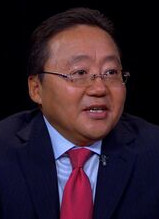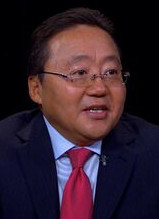


Tsakhiagiin Elbegdorj (born 1963) is a Mongolian politician, journalist, and activist who served as the President of Mongolia from 2009 to 2017. He played a key role in Mongolia's peaceful transition from a communist state to a multi-party democracy in the early 1990s and has been an influential advocate for democracy, human rights, and environmental issues in Mongolia. Known for his reformist and pro-democracy views, Elbegdorj was instrumental in shaping Mongolia's modern political landscape and aligning the country with democratic values and free market principles.
Birth and Early Life: Tsakhiagiin Elbegdorj was born on March 30, 1963, in Zereg village, Khovd Province, in the western part of Mongolia. He grew up in a rural area in a family of herders. His early life gave him an appreciation for Mongolia's nomadic culture and the natural beauty of the country, which would later influence his commitment to environmental protection.
Military Service and Education in the Soviet Union: After completing his secondary education, Elbegdorj joined the Mongolian military and later attended a military college. In 1988, he graduated from the Lviv Military-Political Academy in the Soviet Union (now in Ukraine), where he studied journalism and political education. During his time in the Soviet Union, he became interested in democratic ideas and reform movements, influenced by perestroika and glasnost, policies initiated by Soviet leader Mikhail Gorbachev.
Involvement in the 1990 Democratic Revolution: Upon returning to Mongolia, Elbegdorj worked as a journalist for a state-run newspaper, but he soon became involved in the movement for democratic reforms. In 1989, influenced by the wave of democratization in Eastern Europe and the Soviet Union, Elbegdorj co-founded the Mongolian Democratic Union, which became the leading organization calling for political and economic reforms in Mongolia.
Leading Protests for Democracy: In December 1989, Elbegdorj publicly called for Mongolia to abandon its one-party communist system, becoming one of the first Mongolian leaders to demand democracy and political reforms. In 1990, he helped organize a series of protests and hunger strikes in Ulaanbaatar that led to the Mongolian Democratic Revolution. The movement, marked by peaceful protests and mass demonstrations, culminated in the resignation of the Mongolian People's Revolutionary Party (MPRP) from its monopoly on power, leading to multi-party elections and the establishment of a democratic system in Mongolia.
Founding Free Press in Mongolia: After the success of the democratic revolution, Elbegdorj played a key role in establishing a free press in Mongolia. He co-founded "Democratic Union Newspaper" and "Ardchilal" (Democracy), the first independent newspapers in the country, to promote democratic values, freedom of expression, and transparent governance.
Member of Parliament and Prime Minister: Following the democratic revolution, Elbegdorj was elected to the Great Khural (the Mongolian Parliament) in 1990, and he went on to serve multiple terms as a Member of Parliament throughout his political career. He also served twice as Prime Minister of Mongolia, first briefly in 1998 and again from 2004 to 2006.
Prime Ministerial Terms and Reforms: As Prime Minister, Elbegdorj implemented reforms aimed at liberalizing the economy, attracting foreign investment, and promoting free market principles. He was known for his commitment to reducing bureaucracy, tackling corruption, and improving transparency in government. His reformist agenda was sometimes met with resistance from political opponents, and his terms as Prime Minister were marked by both successes and challenges, including political infighting and economic difficulties.
Election as President: Tsakhiagiin Elbegdorj was elected President of Mongolia in 2009, defeating the incumbent Nambaryn Enkhbayar. He was re-elected for a second term in 2013, becoming the first president in Mongolia’s democratic era to serve two consecutive terms. As president, Elbegdorj focused on promoting democratic governance, environmental protection, and economic development.
Anti-Corruption Efforts: One of the main priorities of Elbegdorj’s presidency was combating corruption. He established the Independent Authority Against Corruption (IAAC) and took steps to strengthen anti-corruption laws and improve government transparency. He was vocal in his criticism of corrupt officials and worked to ensure that high-ranking officials, including former ministers and politicians, were held accountable for their actions. His efforts to combat corruption were part of his broader vision of strengthening democratic institutions and ensuring the rule of law.
Abolition of the Death Penalty: Elbegdorj was a staunch advocate for human rights and made significant strides in promoting these values in Mongolia. In 2010, he announced a moratorium on the death penalty, and in 2012, the Mongolian Parliament officially abolished capital punishment, making Mongolia one of the few countries in Asia to do so. Elbegdorj’s decision to abolish the death penalty was driven by his belief in the sanctity of human life and the need to uphold human rights standards.
Foreign Policy and Regional Relations: Elbegdorj pursued an active foreign policy, seeking to strengthen Mongolia’s ties with the international community and establish Mongolia as a stable and reliable partner. He maintained Mongolia’s "third neighbor" policy, which aimed to build strong relations with countries beyond its immediate neighbors, China and Russia. Under his leadership, Mongolia expanded its diplomatic and economic ties with countries such as the United States, Japan, and members of the European Union. Elbegdorj also emphasized Mongolia’s commitment to international peacekeeping, with Mongolian troops participating in various United Nations peacekeeping missions.
Environmental Protection: Elbegdorj was a vocal advocate for environmental protection and sustainable development. He championed initiatives to protect Mongolia's unique ecosystems and address the challenges of desertification and climate change. He launched the "Green Belt" initiative, aimed at combating desertification through reforestation and sustainable land management. He also promoted the use of renewable energy and took steps to address the environmental impact of mining, a major industry in Mongolia.
Economic Challenges and Mining Policy: During Elbegdorj's presidency, Mongolia experienced rapid economic growth, largely driven by its vast mineral resources, including copper, coal, and gold. However, the country also faced challenges associated with its reliance on mining, including environmental degradation and economic volatility due to fluctuating commodity prices. Elbegdorj sought to balance the need for economic growth with environmental protection and social responsibility. He worked to improve the legal framework governing foreign investment and sought to ensure that the benefits of mining were more equitably shared with the Mongolian people.
Global Advocacy and Public Speaking: After leaving office in 2017, Elbegdorj remained active on the international stage, becoming a prominent advocate for democracy, human rights, and environmental issues. He has been a frequent speaker at international forums, including the United Nations, where he has shared Mongolia's experiences in democratic transition and promoted the values of freedom and human rights. He has also been involved in promoting regional dialogue and cooperation in Northeast Asia.
Involvement in International Organizations: Elbegdorj has been involved with several international organizations that focus on democracy and human rights. He served as a member of the Club de Madrid, an organization of former world leaders working to promote democracy and sustainable development, and the World Leadership Alliance, where he worked with other former heads of state and government to address pressing global challenges. Elbegdorj has also been an advocate for the rights of stateless people and has worked to raise awareness about the plight of vulnerable populations.
North Korean Human Rights Advocacy: Elbegdorj has been a vocal advocate for human rights in North Korea. He has spoken out against the human rights abuses committed by the North Korean regime and has called for greater international pressure to improve the situation. Given Mongolia’s relatively good diplomatic relations with North Korea, Elbegdorj has also tried to play a role in encouraging dialogue and engagement between North Korea and the international community.
Champion of Democracy and Human Rights: Tsakhiagiin Elbegdorj is widely regarded as one of the most important figures in Mongolia’s transition to democracy. He played a central role in leading the peaceful revolution that ended communist rule in Mongolia and worked tirelessly to promote democratic values, free speech, and human rights throughout his political career. His commitment to these principles has earned him respect both in Mongolia and internationally.
Abolition of the Death Penalty: Elbegdorj’s decision to abolish the death penalty was a landmark achievement for human rights in Mongolia. It demonstrated his commitment to aligning Mongolia with international human rights standards and set an example for other countries in the region. His leadership in this area has been recognized globally, and Mongolia's abolition of the death penalty is seen as one of the key human rights achievements of his presidency.
Environmental Advocacy: Elbegdorj's environmental initiatives, including efforts to combat desertification and promote sustainable development, have left a lasting impact on Mongolia's approach to natural resource management. His emphasis on balancing economic growth with environmental protection has influenced Mongolia's policies and raised awareness about the importance of safeguarding the country's unique ecosystems for future generations.
Balancing Relations with Neighbors and Beyond: Elbegdorj's foreign policy helped Mongolia navigate its complex geopolitical environment, bordered by two powerful neighbors—China and Russia. He strengthened Mongolia’s relations with countries beyond its immediate neighbors, known as the "third neighbor" policy, which helped Mongolia diversify its diplomatic and economic ties. This approach has contributed to Mongolia's stability and ability to maintain its sovereignty and independence in a challenging regional context.
Tsakhiagiin Elbegdorj played a pivotal role in transforming Mongolia from a one-party communist state into a thriving democracy. His leadership during the 1990 Democratic Revolution, as well as his contributions as Prime Minister and President, were instrumental in shaping modern Mongolia. As President, he prioritized democratic governance, anti-corruption efforts, human rights, and environmental protection, leaving a legacy as a reformist and progressive leader.
Elbegdorj’s dedication to democracy, his advocacy for human rights, and his environmental initiatives have left a lasting impact on Mongolia and have earned him recognition on the international stage. He remains an influential figure both within Mongolia and globally, continuing to promote the values of freedom, democracy, and sustainability.

We use cookies
We use cookies and other tracking technologies to improve your browsing experience on our website, to show you personalized content and targeted ads, to analyze our website traffic, and to understand where our visitors are coming from. Privacy Policy.